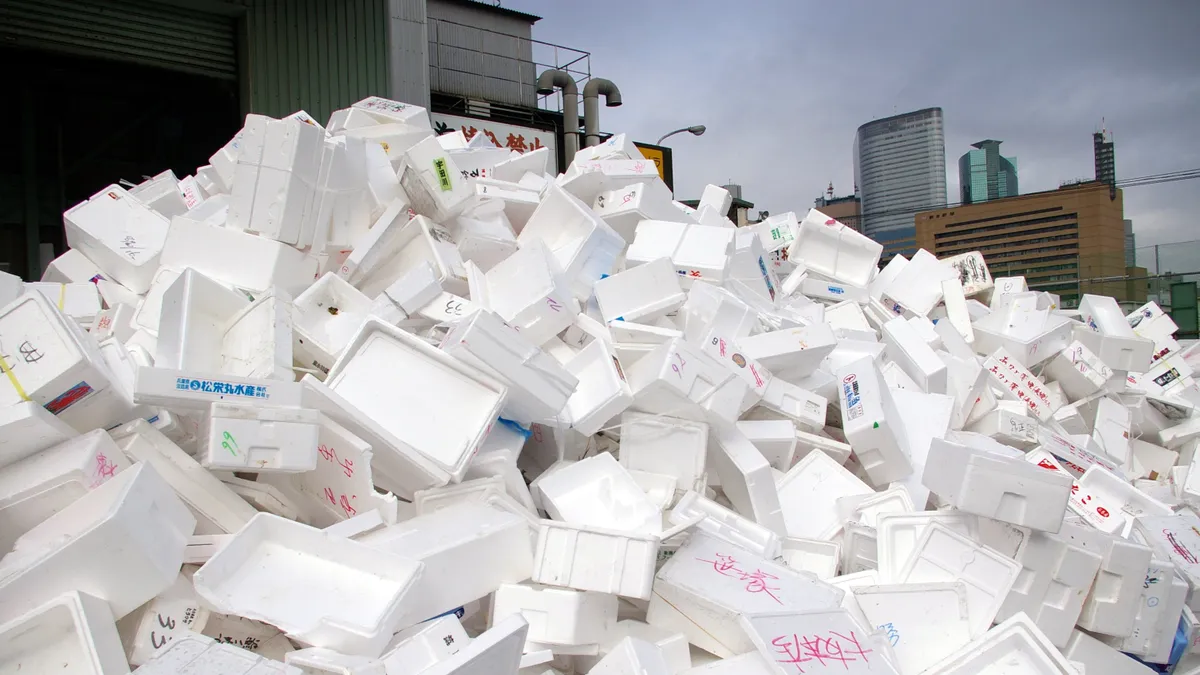Dive Brief:
- New York's Department of Sanitation (DSNY) has reaffirmed its decision to ban the use of expanded polystyrene (EPS) foam products by select food service establishments or the sale of loose EPS "packing peanuts" by stores. The city released a detailed determination on May 12 outlining its findings about the challenges involved with collecting, processing and selling post-consumer EPS, as reported by WNYC.
- This news came shortly after a City Council hearing on a bill, Intro. 1480, that would designate EPS as recyclable and require DSNY to collect it with other residential materials. The bill was supported by the Restaurant Action Alliance and the Dart Container Corporation, which has previously offered to subsidize the costs of sorting and processing EPS through DSNY's existing curbside program.
- Per DSNY's determination, the designated EPS products will be banned as of November 13, 2017. DSNY will initiate education and outreach to affected businesses and refrain from issuing any violations until May 14, 2018.
Dive Insight:
New York's EPS debate dates back to the passage of Local Law 142 of 2013, which gives the DSNY commissioner authority to determine whether single-use EPS food and beverage containers are recyclable. Dart had offered to pay for the installation of new sorting equipment at the Sims Municipal Recycling Facility in Brooklyn and guaranteed it would purchase the bales to be processed at an Indiana facility for at least five years. Commissioner Kathryn Garcia issued a determination against recycling this material at the beginning of 2015 with plans to enact the ban in July 2015. After Dart and others sued, a judge overturned DSNY's determination in September 2015 and the agency began compiling additional research to reinforce their assessment.
The court opinion said DSNY had failed to adequately explain its decision, particularly around the question of whether adequate end markets were available for post-consumer EPS, and that is what they have been focused on since. Citing research from both sides of the debate — Dart and the Natural Resources Defense Council — DSNY built what it asserts is a stronger case for this new decision. Their report cites issues with sorting EPS at MRFs, dealing with contamination from food that may prohibit the material from being densified for transport, and a lack of available end markets that could lead to stockpiling.
DSNY also noted that if it began accepting the material and had to stop that could be disruptive to public engagement efforts. The 2002 decision to limit recycling categories for financial reasons, which led to a decrease in diversion rates that has only now come back around to previous levels, was cited as a main example. Challenges with EPS programs in cities such as Los Angeles and Ontario were also noted. Overall, the report is unsparing in its assessment, reading, "The municipalities and programs that DSNY researched tell a very clear story: Food-Service Foam is not capable of being recycled in an environmentally effective or an economically feasible manner."
This of course runs counter to the position of Dart and other manufacturers that maintain EPS is feasible to recycle and poses no environmental harm. The company continues to expand drop-off locations around the country as new opportunities for densification and processing grow. Dart's backing of Intro. 1480 took some in the New York recycling field by surprise, as they believed this matter had been settled by the September 2015 court decision, but it's possible that the EPS industry knew a new DSNY determination was imminent and wanted to be proactive with their messaging.
Based on how this debate has played out so far, the EPS industry can be expected to push back on DSNY's latest decision and future legal action could be possible. Any decision in New York could set a precedent for other large cities around the country.












